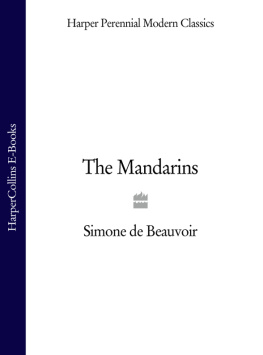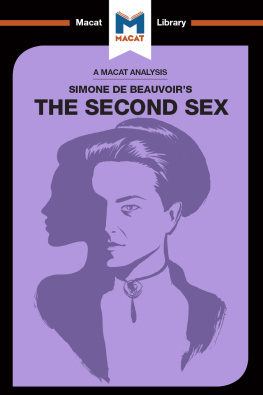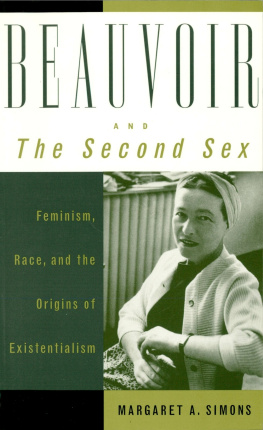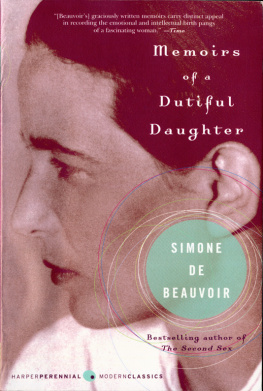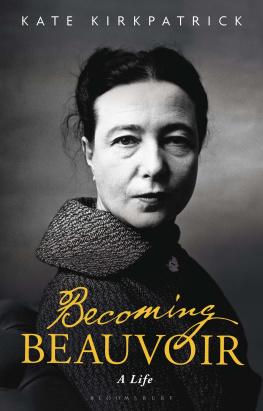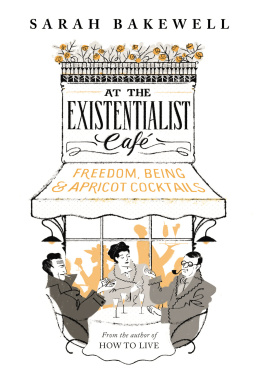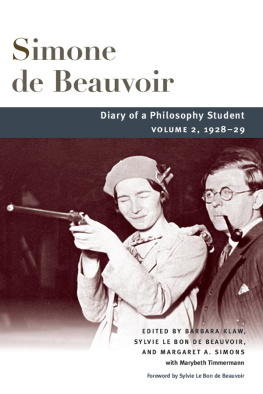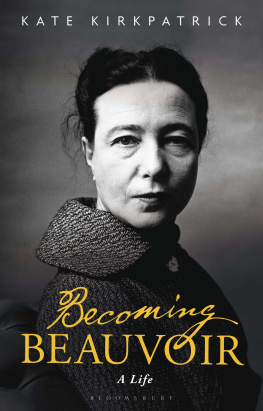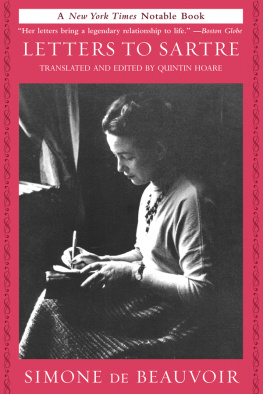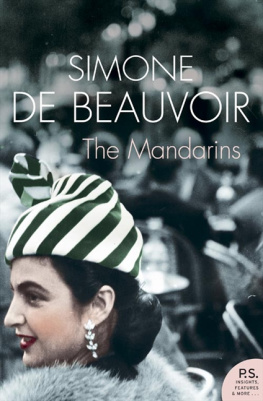Harper Perennial
An imprint of HarperCollinsPublishers
1 London Bridge Street
London SE1 9GF
http://www.harpercollins.co.uk
This Harper Perennial Modern Classics edition published in 2005
Harper Perennial
Previously published in paperback by Flamingo 1993 (as a Flamingo Modern Classic) and 1984 (reprinted five times)
First published in France in 1954 by Librairie Gallimard
under the title Les Mandarins
First English translation published in Great Britain by Collins 1957
Copyright Librairie Gallimard 1954
English translation copyright Collins 1957
Introduction copyright Doris Lessing 1993
PS section copyright Jon Butler 2005 except Equals Not Sequels by Kathy Lette
Kathy Lette 2005
PS is a trademark of HarperCollinsPublishers Ltd
A catalogue record for this book is available from the British Library
This novel is entirely a work of fiction. The names, characters and incidents portrayed in it are the work of the authors imagination. Any resemblance to actual persons, living or dead, events or localities is entirely coincidental.
All rights reserved under International and Pan-American Copyright Conventions. By payment of the required fees, you have been granted the nonexclusive, nontransferable right to access and read the text of this e-book on-screen. No part of this text may be reproduced, transmitted, downloaded, decompiled, reverse engineered, or stored in or introduced into any information storage and retrieval system, in any form or by any means, whether electronic or mechanical, now known or hereinafter invented, without the express written permission of HarperCollins e-books.
Ebook Edition MAY 2018 ISBN 9780007405589
Version: 2018-05-16
HarperCollinsPublishers has made every reasonable effort to ensure that any picture content and written content in this ebook has been included or removed in accordance with the contractual and technological constraints in operation at the time of publication.
To Nelson Algren
by Doris Lessing
Even before The Mandarins arrived in this country it was being discussed with the lubricious excitement used for fashionable gossip. Everyone knew the novel was about the political and sexual lives of Jean-Paul Sartre and Simone de Beauvoir and their friends, a glamorous group for several reasons. First, they were associated with the French Resistance, and of all the heroic myths of the Second World War the Resistance was the most potent. Then, they were French, and it is hard now to explain the degree of attractiveness France had for the British after the war. It was only partly that we knew our cooking and our clothes to be inferior, that they had a style and panache we lacked. The British had been locked up in their island for the long years of the war, could not refresh themselves outside it, and France wore the features of some forbidden Paradise. And, too, intellectual communism, intellectuals generally, were glamorous in a way they never have been here, not least because what The Mandarins were debating along the Left Bank were questions about the Soviet Union scarcely acknowledged in socialist circles here, or, if so, only in lowered voices. There was another reason why The Mandarins was expected to read like a primer to better living, and that was the relationship between Sartre and de Beauvoir, presented by them, or at least by Sartre, as exemplary. It was close and matey, like a marriage, but without the legalities and obligations of one, while both partners had absolute freedom to pursue sexual adventures they fancied. This arrangement, needless to say, appealed particularly to men, and innumerable sceptical women were lectured by actual or possible mates on how they should take a lesson from Simone, a woman above the petty jealousies that disfigure our sex. As it turned out, women were right to be sceptical, but there was for us too an attraction in that comradely relationship over there in Les Deux Magots and the Flore, where Jean-Paul and his long-term woman Simone together with all his petites amies, where Simone and her steady, Jean-Paul, and her other little loves, male and female, all forgathered daily to partake of lofty intellectual fare, watched by hundreds of reverential disciples. But it turned out there was nothing of this ideal relationship in the novel, and the Simone figure, Anne, was presented as a dry and lonely woman, in a companionable marriage, resigned to early middle age.
Sartre then stood for an adventurous optimism about science. There was a film about him, showing him stepping out of a helicopter, then the newest of our toys, hailing the brave new world of technology, the key to unlimited progress. We needed this kind of re-evaluation, after watching for the years of the war how war used our inventions and discoveries for destruction.
And then, there was Existentialism. Just as most communists had never read more of Marx than The Communist Manifesto, most people attracted by Existentialism had read Sartres plays and novels. Thus diluted, it was agreeable latter-day stoicism that steadily confronted the terrors of the Universe while refusing the weakminded consolations of religion; courageous, solitary, clear-minded.
The Left Bank was, quite simply, the intellectual centre of the world, no less, and here was The Mandarins, a guide to it written by one of its most glittering citizens.
But Paris was only the half of it. Simone de Beauvoir had had a much publicized affair with Nelson Algren, and the novel describes it. Algren, then, was famous for The Man with the Golden Arm, and A Walk on the Wild Side, cult novels romanticizing the drug and crime cultures of big American cities. Drugs, crime and poverty were as glamorous as, earlier, had been La Vie Bohme with its TB, its drunkenness, the misery of poverty. The bourgeoisie have always loved squalor in fiction. (In those days the words bourgeoisie, bourgeois, petit-bourgeois tripped off all our tongues a dozen times a day, but now it is hard to use them without being overcome by staleness, by boredom.) To be bourgeois was bad, middle-class values so disgusting that people dying of drugs, or in prison for selling drugs, or with lives wasted by poverty were in every way preferable, full of poetry and adventure that cocked a snook at capitalism and the middle class. Where Simone de Beauvoir loved and was loved by Nelson Algren it was the symbolical mating of worlds apparently opposite but linked by a contempt for the established order, and a need to destroy it.
All that has gone, no glamour left, and to read The Mandarins without those flattering veils has to be a sobering experience. What remains? For one, the politics of that time. Young people are always asking, But how was it possible that people could support the Soviet Union at all? Here it all is, the debates, the agonizings, the betrayals, the hair-splittings, the compromises and the self-deceptions. What it was all based on, what was never questioned, was the belief that no matter how terrible the Soviet Union was, it had to be better than capitalism, bound to be the future of the whole world once the infant communism was over its teething troubles. Another never-questioned pillar was that whatever decisions one made, whatever stance one took, were of importance to the whole world: the future of the world was at stake, dependent on the correct or otherwise decisions of those people who as the phrase then went knew the score. Initiates that was what they were, or how they saw themselves.

